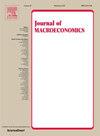从新闻学习
IF 1.5
3区 经济学
Q3 ECONOMICS
引用次数: 0
摘要
本文在放松理性预期假设的同时,通过评估TFP新闻冲击的实证重要性,对两股经济周期文献——新闻冲击和有限理性——做出了贡献。在理性预期(RE)和自适应学习(AL)两种不同的预期形成机制下,我们估计了一个包含金融摩擦和全要素生产率新闻冲击的中等规模DSGE模型。结果表明,人工智能放大了金融市场摩擦的影响,导致三个关键发现。首先,如相关文献所示,人工智能提高了模型的拟合,并更好地复制了几个总变量的波动率。其次,全要素生产率的放大导致了通货紧缩的反应,以及贷款息差对全要素生产率新闻冲击的更持久的反应。第三,人工智能增加了纯新闻冲击(即纯预期冲击)的重要性,通过预期和信贷渠道放大了它们的影响。最后,我们发现,在AL下,DSGE模型产生的动态比RE版本的DSGE模型产生的动态更接近经验VAR证据。本文章由计算机程序翻译,如有差异,请以英文原文为准。
Learning from news
This paper contributes to two strands of business cycle literature — news shocks and bounded rationality — by assessing the empirical importance of TFP news shocks while relaxing the rational expectations assumption. We estimate a medium-scale DSGE model, incorporating financial frictions and TFP news shocks, under two different expectation formation mechanisms: rational expectations (RE) and adaptive learning (AL). The results suggest that AL amplifies the effects of financial market frictions, leading to three key findings. First, AL improves the model’s fit, as shown in the related literature, and better replicates the volatility of several aggregate variables. Second, the AL amplification results in a deflationary response and a more persistent reaction of lending spreads to TFP news shocks. Third, AL increases the importance of pure news shocks (i.e. purely anticipated shocks), amplifying their effects through both expectation and credit channels. Finally, we show that the dynamics generated by the DSGE model under AL align more closely with empirical VAR evidence than those produced by the RE version of the DSGE model.
求助全文
通过发布文献求助,成功后即可免费获取论文全文。
去求助
来源期刊

Journal of Macroeconomics
ECONOMICS-
CiteScore
2.50
自引率
7.10%
发文量
53
审稿时长
76 days
期刊介绍:
Since its inception in 1979, the Journal of Macroeconomics has published theoretical and empirical articles that span the entire range of macroeconomics and monetary economics. More specifically, the editors encourage the submission of high quality papers that are concerned with the theoretical or empirical aspects of the following broadly defined topics: economic growth, economic fluctuations, the effects of monetary and fiscal policy, the political aspects of macroeconomics, exchange rate determination and other elements of open economy macroeconomics, the macroeconomics of income inequality, and macroeconomic forecasting.
 求助内容:
求助内容: 应助结果提醒方式:
应助结果提醒方式:


